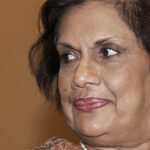The Club de Madrid will convene October 1st and 2nd, with the support of the Alan B. Slifka Foundation, a group of 20 international experts with the objective of designing a packet of proposals, policies and practical recommendations intended to promote the role of women as agents of social, political and economic change in divided societies. In this manner they can fight against the double discrimination that the women suffer in their communities. The sessions, which will take place in the O’Reilly Palace of Madrid, will be led by one Members of the Club de Madrid: Chandrika Kumaratunga, ex President of Sri Lanka from 1994-2005. Kumaratunga will share her experiences in government concerning the empowerment of women in cases of double discrimination.
The panel of experts includes, among others, the ex Ombudswoman and ex Prime Minister, Beatriz Merino; member of the European Parliament Kinga Göncz, the baroness Nuala O’Loan, member of the House of Lords and the ex Omudsman of the People of Northern Ireland; Sir John Kaputin, ex Secretary General of the Group of Africa, Caribbean and Pacific Group of States; Rita Izsák, an independent expert on minorities and human rights that works for the United Nationas, and Sarah Silver, executive director of the Alan B. Slifka Foundation, financer of the project.
Project for an Inclusive Society is going to analyze elements that they find impact double discrimination against women, which include: the lack of educational opportunities that women belonging to minorities have in comparison to men, the high price they pay for becoming agents of social change within their communities and that which causes a great lack of female leaders that involve themselves in politics and the limited knowledge of human rights and gender.
During the two days of work concrete studies about the minorities of women that suffer double discrimination like the women of Dalit de India will be presented. In the bottom part of the caste system of the country, the women belonging to this segment of society are separated from educated and cultured places, in dining rooms, in medical attention or even in the access to water. The statistics show an average of 1,000 annual violations against women of this group, the highest rate in Indian society. The questions concerning Muslim women in the UK, the gypsy women in Europe, the Kurdish women in Iraq or the nomadic Irish women will also be analyzed
There will also be time to consider lessons learned from the experience of successes such as the Caucus for Women Leaders in Kenya, a national network structure in 29 regional assemblies dedicated to strengthening the political and social leadership of women in that country. Included in their activities is the participation in the peaceful resolution of conflicts between all groups, ethnic minorities and majorities, especially since the escalation of violence that followed the 2007 elections. Also, the group carries out informational activities about HIV/AIDS and the momentum of political and economic participation of women.
This Group of Labor against the Double Discrimination is an initiative of the Project for an Inclusive Society of the Club de Madrid in collaboration with the Alan B. Slifka society. The Project has worked for six years to create societies that respect the dignity and the rights of all of its members, tolerant and free societies in that which the minorities can express their voice and integrate themselves in the general population. Through the leadership and experience of its members, the Club de Madrid works all over the world with various governments, institutions and their leaders to advise them on the best strategies for constructing an inclusive society.
Complete list of participants and biographies
Program
Study cases and successful experiences
